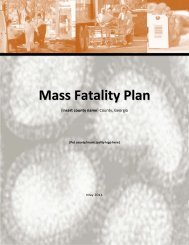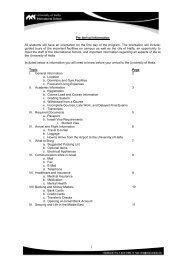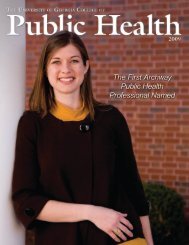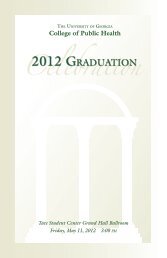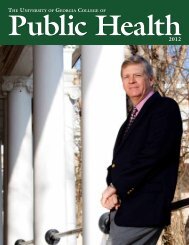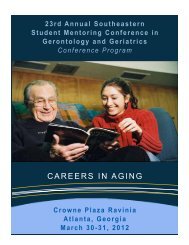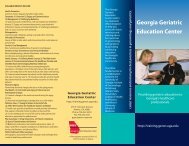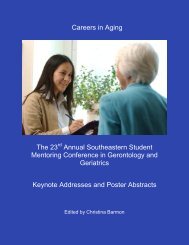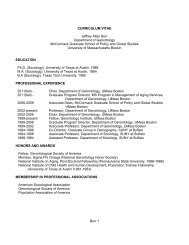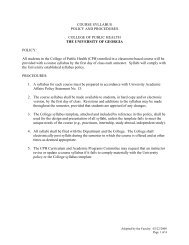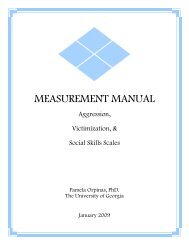2007/2008 CPH Magazine - College of Public Health - University of ...
2007/2008 CPH Magazine - College of Public Health - University of ...
2007/2008 CPH Magazine - College of Public Health - University of ...
You also want an ePaper? Increase the reach of your titles
YUMPU automatically turns print PDFs into web optimized ePapers that Google loves.
<strong>Public</strong> <strong>Health</strong>Th e Un i v e r s i t y o f Ge o r g i a Co l l e g e o fWinter <strong>2007</strong>MakingGeorgia<strong>Health</strong>ierWinter <strong>2007</strong> 1
Letter from the Dean<strong>College</strong> <strong>of</strong> <strong>Public</strong> <strong>Health</strong><strong>Magazine</strong> <strong>2007</strong>/<strong>2008</strong>Vol.1, N.1Phillip L. Williams, Ph.D.DeanEric Dahl, Ph.D.Associate Dean for<strong>Health</strong> Science InitiativesRobert S. Galen, M.D., M.P.H.Associate Dean forResearch and OutreachValerie Hepburn, Ph.D.Assistant Dean for AcademicAffairsContributing writerMary Jessica HammesDesignLindsay RobinsonContactKate LindseyDirector <strong>of</strong> Development<strong>College</strong> <strong>of</strong> <strong>Public</strong> <strong>Health</strong>N122C Coverdell Center<strong>University</strong> <strong>of</strong> GeorgiaAthens, GA 30602706-542-2590krl@uga.eduwww.publichealth.uga.eduThe <strong>University</strong> <strong>of</strong> Georgia is a unit <strong>of</strong> the<strong>University</strong> System <strong>of</strong> Georgia. The <strong>University</strong> <strong>of</strong>Goergia is an equal Employment Opportunity/Affirmative Action Institution.In compliance with federal law, including the provisions <strong>of</strong>Title IX <strong>of</strong> the Education Amendments <strong>of</strong> 1972, Title VI <strong>of</strong>the Civil Rights Act <strong>of</strong> 1964, Sections 503 and 504 <strong>of</strong> theRehabilitation Act <strong>of</strong> 1973, and the Americans with DisabilitiesAct <strong>of</strong> 1990, the <strong>University</strong> <strong>of</strong> Georgia does not discriminateon the basis <strong>of</strong> race, sex, religion, color, national or ethnicorigin, age, disability, or military service in its administration<strong>of</strong> educational policies, programs, or activities; its admissionspolicies; scholarship and loan programs; athletic or other<strong>University</strong>-administered programs; or employment. In addition,the <strong>University</strong> does not discriminate on the basis <strong>of</strong> sexualorientation consistent with the <strong>University</strong> non-discriminationpolicy. Inquiries or complaints should be directed to the director<strong>of</strong> the Equal Opportunity Office, Peabody Hall, 290 SouthJackson Street, <strong>University</strong> <strong>of</strong> Georgia, Athens, GA 30602.Telephone 706-542-7912 (V/TDD). Fax 706-542-2822In 2005, the <strong>College</strong> <strong>of</strong> <strong>Public</strong> <strong>Health</strong> was establishedwith our highest priority being to improve the health<strong>of</strong> the citizens <strong>of</strong> Georgia, and for the last two years, wehave been doing just that. In addition to providing highquality, affordable public health education and trainingto Georgians, the <strong>College</strong> <strong>of</strong> <strong>Public</strong> <strong>Health</strong> also isserving the state by:• Studying the effect <strong>of</strong> the recent wild fires on the air quality inSouth Georgia;• Investigating the Clean Indoor Air Act’s impact on outdoor airquality in Athens;• Conducting a mass casualty exercise simulating pandemicavian flu to test the readiness and response <strong>of</strong> Georgiahospitals to a large-scale mass casualty crisis;• Implementing and evaluating a program in North Georgiamiddle schools to prevent violence;• Evaluating wellness policies to address childhood obesity inAtlanta <strong>Public</strong> Schools;• Studying the human pathogens found in Georgia’s estuariesand shellfish and their affect on the health <strong>of</strong> Coastal Georgiapopulations.The cover story in this issue <strong>of</strong> the <strong>College</strong> <strong>of</strong> <strong>Public</strong> <strong>Health</strong>magazine dives deeper into our commitment to serve the stateand examines not only what we’ve already done but also theimpact we can have on the state’s health in years to come. We haverapidly evolved over the past few years, and this fall we enrolledour first Doctor <strong>of</strong> <strong>Public</strong> <strong>Health</strong> students. Heather Edelbute, amember <strong>of</strong> this first cohort, is highlighted in the <strong>Health</strong> Policyand Management section <strong>of</strong> the magazine. Meanwhile, our Master<strong>of</strong> <strong>Public</strong> <strong>Health</strong> program continues to grow, and I hope you willenjoy reading about some <strong>of</strong> these students in the departmentalsections. Another important feature in this issue is an updateon the Institute for <strong>Health</strong> Management and Mass DestructionDefense, which joined our college last summer.As alumni and friends <strong>of</strong> the <strong>College</strong> <strong>of</strong> <strong>Public</strong> <strong>Health</strong>, you arevery important to us, and we hope to hear from you <strong>of</strong>ten. Thankyou for supporting our commitment to making Georgia and theworld a safer and healthier place.Sincerely,Phillip L. Williams, Ph.D., Dean2 <strong>College</strong> <strong>of</strong> <strong>Public</strong> <strong>Health</strong>
Dahl Galen HepburnAssociate and AssistantDeans Appointed at the<strong>College</strong> <strong>of</strong> <strong>Public</strong> <strong>Health</strong>u The <strong>College</strong> <strong>of</strong> <strong>Public</strong> <strong>Health</strong> announcedthe appointments <strong>of</strong> Dr. EricDahl and Dr. Robert S. Galen as associatedeans and Dr. Valerie Hepburn asassistant dean for the <strong>College</strong> <strong>of</strong> <strong>Public</strong><strong>Health</strong>.In addition to his appointment asassociate dean, Dr. Eric Dahl will serveas a clinical pr<strong>of</strong>essor in the Department<strong>of</strong> <strong>Health</strong> Policy and Management. Hewill also manage the <strong>College</strong>’s activitiesin the health sciences as he continues hisrole in the university’s medical educationinitiatives.Dahl has a long history in highereducation administration. At UGA, hehas assisted the provost and faculty informing the <strong>College</strong> <strong>of</strong> <strong>Public</strong> <strong>Health</strong>,UGA’s Biomedical and <strong>Health</strong> SciencesInstitute, the Faculty <strong>of</strong> Engineering,the New Media Institute and other programs.Dahl, who is a Rhodes Scholar,also works with the UGA Honors Programin selecting and preparing UGAcandidates for the Rhodes and otherscholarships. In additon to a B.A. andM.A. from Oxford, he holds a Ph.D.from the <strong>University</strong> <strong>of</strong> Washington.As associate dean, Dr. Robert S.Galen will oversee the <strong>College</strong>’s outreachand research activities and willmaintain his faculty appointment as apr<strong>of</strong>essor in the Department <strong>of</strong> Epidemiologyand Biostatistics.Galen received his medical degreefrom Boston <strong>University</strong> School<strong>of</strong> Medicine, completing his internshipand residency in clinical pathology atColumbia-Presbyterian Medical Centerand his Master <strong>of</strong> <strong>Public</strong> <strong>Health</strong> degreefrom Columbia <strong>University</strong>. Priorto coming to UGA, he served on themedical school faculties <strong>of</strong> Columbiaand Case Western Reserve <strong>University</strong>.His research interests have focused onbiomarkers <strong>of</strong> chronic disease and thenewly emerging field <strong>of</strong> telemedicine.Galen is particularly interested in underservedpopulations in public health,especially indigenous populations in thedeveloping world, and is the director <strong>of</strong>the <strong>College</strong>’s study abroad programs inVietnam and China. He also serves aschair <strong>of</strong> the Division <strong>of</strong> <strong>Public</strong> <strong>Health</strong><strong>of</strong> the Biomedical <strong>Health</strong> Science Institute.Dr. Valerie Hepburn will jointhe <strong>College</strong> <strong>of</strong> <strong>Public</strong> <strong>Health</strong> as assistantdean and assistant pr<strong>of</strong>essor <strong>of</strong>health policy and management in January.Hepburn will be responsible for allacademic matters other than promotionand tenure, and will lead the <strong>College</strong>’sCouncil on Education for <strong>Public</strong> <strong>Health</strong>(CEPH) accreditation effort.Hepburn earned her Ph.D. in publicadministration and policy from the<strong>University</strong> <strong>of</strong> Georgia’s School <strong>of</strong> <strong>Public</strong>and International Affairs and has over25 years experience in state government,including a long tenure in the departments<strong>of</strong> Community <strong>Health</strong> and HumanResources. She recently served asprincipal investigator for the state’s TaskForce on <strong>Health</strong> Pr<strong>of</strong>essions, chaired bythe president <strong>of</strong> the Medical <strong>College</strong> <strong>of</strong>Georgia, and is the program consultantfor the Board <strong>of</strong> Regents’ AdministrativeCommittee on <strong>Public</strong> <strong>Health</strong>. Sherecently returned from Australia, where,as one <strong>of</strong> two 2006 Packer Policy Fellows,whe spent six months researchingcomparative health workforce policy.Hepburn was associate director <strong>of</strong> GeorgiaState <strong>University</strong>’s Institute <strong>of</strong> <strong>Public</strong><strong>Health</strong>.“Drs. Dahl, Galen, and Hepburnwill make significant contributions toour college as skilled educators, researchersand administrators,” said PhilWilliams, dean <strong>of</strong> the <strong>College</strong> <strong>of</strong> <strong>Public</strong><strong>Health</strong>. “Their strong commitment tostudents, combined with extensive publishedresearch and knowledge <strong>of</strong> Georgia’spublic health concerns, will help uscontinue to develop and provide exceptionalservice to the state.”Winter <strong>2007</strong> 3
Impact in Athensand BeyondThat spirit <strong>of</strong> collaboration acrossdepartments is echoed in the college’swork with community groups—likeFisher’s TCE sampling project in Winterville.“Athens presents the perfect opportunityfor the <strong>College</strong> <strong>of</strong> <strong>Public</strong> <strong>Health</strong>to get involved with the community; thecity is home to some <strong>of</strong> the best medical,research, and public outreach programs,”says recent graduate Kevin Caspary, whois now a chemical and radiation plannerfor the Georgia Division <strong>of</strong> <strong>Public</strong><strong>Health</strong>’s Office <strong>of</strong> Preparedness. “I thinkthe <strong>CPH</strong> can help link the medical andacademic communities to address healthdisparities that exist in Athens. As theflagship university for the state, a majorgoal <strong>of</strong> UGA is to address public healthand healthcare needs in Georgia. Whynot start close to home?”“The ‘public’ in public health meanswe have to be good communicators especiallyin these times <strong>of</strong> great uncertainty,”says Cham Dallas, director <strong>of</strong> theInstitute for <strong>Health</strong> Management andMass Destruction Defense and an expertin addressing public health concernsacross the globe. He has given addressesat the United Nations and regularly discusseshis research on Fox News, but healso chose a Georgia focus for a series <strong>of</strong>large hospital exercises simulating a masscasualty event to predict impacts on thehealth system. A resulting publication <strong>of</strong>his spent four weeks as the most accessedpaper on the BioMed Central Website.By providing students with firsthandexperiences, community collaborationis also beneficial to <strong>College</strong> <strong>of</strong> <strong>Public</strong><strong>Health</strong> students, says Doug Skelton, director<strong>of</strong> Georgia’s Coastal <strong>Health</strong> Districtand a member <strong>of</strong> the <strong>CPH</strong> Dean’sAdvisory Council. He says that he canimagine a group <strong>of</strong> UGA graduate studentsvisiting his health district to observerestaurant inspections, tattoo parlors, rabiescontrol, septic systems, economicimpact issues, beach water advisories andshellfish samples.“Environmental health issues area major concern in the Coastal <strong>Health</strong>District—lead contamination in Savannahand Brunswick, beach water qualityin Jekyll, St. Simons and Savannah anddeclining oxygen content in coastal waterswith major ecological shifts ahead ifchanges don’t occur upstream,” he says.“And, <strong>of</strong> course, avian flu and the risk <strong>of</strong> apandemic. We have a lot <strong>of</strong> preparednessefforts ongoing.”“A <strong>College</strong> <strong>of</strong> <strong>Public</strong> <strong>Health</strong> atGeorgia’s flagship university must playa huge role in focusing and advancingpublic health, from a dynamic studentassociation to field research, to perhapsdeveloping a teaching/learning healthdistrict or county health department,”Skelton says.Farther away from home, the <strong>College</strong>reaches out internationally with severalstudy abroad programs, addressinghealth issues specific to the communitiesoverseas. Carol Cotton, an academic pr<strong>of</strong>essionalin <strong>Health</strong> Promotion and Behavior,teaches a special topics class in thatsubject for the Croatia Maymester StudyAbroad Program; Bob Galen, a physicianand one <strong>of</strong> <strong>CPH</strong>’s associate deans, leadsstudents to Vietnam every Maymester,where they can attend the Hanoi School<strong>of</strong> <strong>Public</strong> <strong>Health</strong>; and Luke Naeher, assistantpr<strong>of</strong>essor in environmental healthscience, has traveled <strong>of</strong>ten to Peru tostudy air quality.Graduating expertsIn its three years <strong>of</strong> existence, the<strong>College</strong> has already built a heady reputation.“We’re the only purely academicunit on campus that from the beginninghas brought in more annual researchdollars than state budget support,” saysWilliams. “We’re really rather proud <strong>of</strong>that.”Also, demand for <strong>CPH</strong> degrees ishigh. There were 150 applicants vyingfor the 45 spots in the first Master <strong>of</strong><strong>Public</strong> <strong>Health</strong> class, and 15 applicants appliedfor the three spots in the Doctor <strong>of</strong><strong>Public</strong> <strong>Health</strong> programs, which debutedthis fall.The college <strong>of</strong>fers bachelor degreesin environmental health and health promotion;master degrees in public health,environmental health and toxicology;and doctoral degrees in health promotionand behavior, toxicology and the recentlyadded Doctor <strong>of</strong> <strong>Public</strong> <strong>Health</strong>. Studentscan also pursue a graduate certificatein gerontology; a health promotionand behavior certificate, either throughWomen’s Studies or Gerontology; orcertificates in atmospheric sciences, environmentalethics, international agricultureor water resources through Environmental<strong>Health</strong> Science.Just as faculty and staff use their expertiseto aid Athens, the state and othercountries, <strong>CPH</strong> students are alreadymaking their marks in the world.6 <strong>College</strong> <strong>of</strong> <strong>Public</strong> <strong>Health</strong>
Caspary received his bachelor’s degreein Environmental <strong>Health</strong> Sciencein 2004 and his Master <strong>of</strong> <strong>Public</strong> <strong>Health</strong>degree in 2006. As an undergraduate, hewas a research diver for associate pr<strong>of</strong>essorErin Lipp, tracing the source <strong>of</strong> microbialthreats in the coral reefs <strong>of</strong> theFlorida Keys. As a graduate student, hestudied exposure to dust and endotoxinamong poultry workers, examining thelink between high levels <strong>of</strong> dust and respiratoryhealth. He also spent a summerin rural Ecuador, working in Quitoand Lago Agrio, helping the local healthprogram director find grant opportunities,develop an electronic database andestablish a water treatment program.Now, in his position in the state’sOffice <strong>of</strong> Preparedness, Caspary worksto ensure Georgians know what to do inthe face <strong>of</strong> hazardous materials.“My focus ranges from industrial andtransportation accidents to acts <strong>of</strong> terrorism,but the goal is always the same:to ready public health and health carepersonnel to quickly and competentlyrespond to events involving chemical orradiological materials,” he says.The importance <strong>of</strong> giving UGA studentsthe opportunity to study public healthcould not be more clear for Caspary.“I remember (Environmental <strong>Health</strong>Science adjunct pr<strong>of</strong>essor) Dr. DarylRowe telling us that the problem withworking in prevention is that few peoplerecognize the benefits <strong>of</strong> these efforts,”“A <strong>College</strong> <strong>of</strong> <strong>Public</strong> <strong>Health</strong>at Georgia’s flagshipuniversity must play ahuge role in focusingand advancing publichealth, from a dynamicstudent association t<strong>of</strong>ield research, to perhapsdeveloping a teaching/learning health district orcounty health department.”he recalls. “It’s only when the system isbroken that some people start paying attention.The truth is that public healthand health care in the U.S. have accomplishedgreat things in the last century,and people expect it to stay that way. Butas with any other system, there are realcosts associated with its maintenance, letalone its improvement. I’m not sure peopletruly understand that public health isa long-term investment, and that it is notsomething that can be turned on and <strong>of</strong>fas funding permits. “Jill McElheney is one <strong>of</strong> those citizenswho does understand that publichealth is a long-term investment. Shealso understands that magical momentwhen research, grants, papers, pr<strong>of</strong>essorsstudents all come together to provide andtangible improvements in public health.In short, it’s about the community, peopleyou haven’t met and never will, andkeeping them all healthy.Though McElheney runs a religious-influencedmission, and Fisher isa scientist, she says that they aren’t thatdifferent.“Ministry work is about people,putting the needs <strong>of</strong> families as a priority,”she says. “I look for resources thatwill benefit the sick and suffering fromenvironmental health diseases. Dr. JeffFisher is a TCE scientist, but his purposeis to protect the health <strong>of</strong> the public. Sohe and I share common values.”Alit er sum exerius cipissed ea feum nisit augue dionullut del elisi eu facin vel ullaadiatio nsenisse molobore eugait.Winter <strong>2007</strong> 7
Environmental <strong>Health</strong> ScienceBeyond AcademiaUptatum qui eu feummodignaacincil essectemincilit in ver illaore faciduitatin henibh eugait iuremagnit wisci tin etum ditIn Environmental <strong>Health</strong> Science, the pr<strong>of</strong>essors andtheir students are detectives, <strong>of</strong>ten examining the smallerdetails—whether it’s Prozac in frogs or Listeria in guineapigs—to get the big picture. The results have impact beyondthe academic community, perhaps best illustrated by NakanishiMotor Corporation’s recent decision to alter productionat their Athens’ plant, all prompted by a student study <strong>of</strong> airbornetoxins (see cover story).Air pollution is not the only environmental public healthconcern. Assistant pr<strong>of</strong>essor Erin Lipp is researching waterbornesalmonella in a toxic hotbed that sorely needs help.“We’ve consistently been the top for salmonella cases inthe country,” she says.Indeed, in 2002, the national average <strong>of</strong> salmonella caseswas 11.5 per 100,000 people. The Georgia average for thatyear was 23.5 per 100,000, and in the Valdosta area, it was80.5 per 100,000.As the salmonella strains in south Georgia aren’t commonlyassociated with food production, Lipp’s team is studyingthe Little River watershed in Turner and Tift counties.So far, they’ve found that salmonella cases rise with peakingsummer temperatures and increased rainfall, and their findingshave big potential for the residents <strong>of</strong> that area.Such work “is satisfyingbecause you know what you’redoing has an impact.”- Erin Lipp“The state is interested in putting together educationalinformation on this, because it’s such a burden to the area,”says Lipp. Her research will help educate residents abouthow to avoid contamination, and it may trigger more intenseinvestigation from the state to hone in on actual sources <strong>of</strong>salmonella.Such work “is satisfying because you know what you’redoing has an impact,” she says.Marsha Black, Associate pr<strong>of</strong>essor and EHS interim departmenthead, also works with water. Her recent researchhas found that Prozac in the water supply has significant impacton aquatic animals. Gambusia affinis (or mosquito fish)exposed to Prozac take a significantly longer time to reachreproductive maturity; Xenopus laevis (African clawed frogs)exposed to Prozac experience delays in undergoing metaphorphosis,and are smaller once they do reach metamorphosis,which increases their risk for predation—as smallerfrogs, they can be eaten by smaller animals, increasing thepool <strong>of</strong> predators.There are several human implications beyond just theinterest Black’s research holds for aquatic health.The aquatic animals “are early warning signals for chemicalsthat might ultimately harm humans,” she says. Knowingthat the chemicals are in the water in the first place can leadto improved water treatment processes. Also, as frog metamorphosisis cued by the thyroid, Black can study relationshipsbetween Prozac and human thyroid production.Associate pr<strong>of</strong>essor Mary Alice Smith’s research <strong>of</strong> Listeriacontamination in monkeys and guinea pigs may one daylead to vaccines or new treatment therapies for the toxin’s8 <strong>College</strong> <strong>of</strong> <strong>Public</strong> <strong>Health</strong>
susceptible targets: pregnant women,older adults and people with compromisedimmune systems.Pregnant women infected withListeria can have stillbirths. “Fortunately,it doesn’t happen a lot, butwhen it does, it’s a devastating thing,”says Smith. Older people or thosewith compromised immune systemsare also susceptible to the toxin.Smith’s research may reveal if there isany amount <strong>of</strong> Listeria exposure thatis safe.Like all <strong>of</strong> her colleagues, Smith<strong>of</strong>ten works with other researchesacross campus. The <strong>College</strong> <strong>of</strong> <strong>Public</strong><strong>Health</strong>’s interdisciplinary nature iscrucial, Smith says.“To really tackle the big problemsin terms <strong>of</strong> a disease, you have to collaborate,”she says. “No one personhas all the expertise to do all that has tobe done. My success with the Listeriawork has been because I’ve collaboratedwith microbiologists, pathologists,primatologists, immunologists…It reallytakes a whole team <strong>of</strong> people tounderstand that disease process.”And in the end, Smith, like hercolleagues, takes satisfaction knowingthat her work serves the interests <strong>of</strong>public health.“I really enjoy doing researchthat has potential for outside <strong>of</strong> academics,”she says.—Mary Jessica HammesFrom left to right: John Pearce, Megan Williams, Gordon Martin, and David BrownOh, the Places You’ll GoLooking back at his experience at the <strong>College</strong> <strong>of</strong> <strong>Public</strong> <strong>Health</strong>, JohnPearce remembers taking air samples in Peru, fine-tuning cutting-edge geospatialtechnology and winning first prize in a poster competition in Paris.“I can honestly say that the <strong>College</strong> took me places I never thought I wouldgo,” he says.Pearce graduated last spring with a master’s degree in environmental healthand certification in geographic information systems and plans to pursue a Ph.D.He found his taste for science as a boy in Clayton, Ga.“My mom was a science teacher,” he says. “When I was a kid, I was alwaysreading guide books and National Geographic. I was like, ‘This is so cool!’ Andthat’s when I first became interested in science.”While getting his bachelor’s degree in ecology at UGA, Pearce was introducedto a branch <strong>of</strong> geospatial technology called geographic information systems,or a computer-based system that handles spatial information and can createmaps. The technique is adaptable to many fields, including forestry, ecology,geography and urban planning. He found it “fascinating and revolutionary.”Between undergraduate and graduate studies, he familiarized himself evenmore with the technology while working for a local planning company.“I was impressed with what the technology could do, and wanted a challengingproblem to apply it to,” he says.He found that challenge in Cusco, Peru. In summer <strong>of</strong> 2005, Pearce waspart <strong>of</strong> a student team who traveled to Cusco with Luke Naeher, assistant pr<strong>of</strong>essorin Environmental <strong>Health</strong> Science, to research air pollution there. Naeher,who was recognized as the <strong>2007</strong> Outstanding Teacher for the <strong>College</strong> <strong>of</strong> <strong>Public</strong><strong>Health</strong> at last spring’s Honors Day, directed the project, along with ManuelAguilar Villalobos <strong>of</strong> Environmental Air Association, Lima–Peru, Cusco’s cityhall and Cusco’s department <strong>of</strong> health and transportation.The researchers found that air pollution levels were relatively high both onthe streets congested with traffic and in homes, where cooking is fueled by openfires—sometimes made from toxic plastics. Another concern is the combination<strong>of</strong> thin air and increased rates <strong>of</strong> respiratory illness, as 800,000 tourists visitCusco yearly to explore ancient Incan ruins in the mountains.In October 2006, Naeher and others traveled to Cusco to share the teams’findings with city <strong>of</strong>ficials, thus ensuring future collaboration between UGAand Peruvian universities with the hope <strong>of</strong> developing policies and regulationsto control the pollution.As for Pearce, his poster on the project went to the International Society <strong>of</strong>Exposure Analysis 2006 Conference in Paris. He won first place in the studentcompetition.“I was very surprised to win the award and was quite honored,” he recalls.—Mary Jessica HammesWinter <strong>2007</strong> 9
Epidemiology and BiostatisticsDr. Claire Robb (right) metwith Dr. Martine Extermannand Dr. William Haley atM<strong>of</strong>fitt Cancer Center inTampa, Fla, to discuss hercontinuing research in thearea <strong>of</strong> cancer and aging.Life After Breast CancerThere’s no need for aging adults toresign themselves to illness. After all,aging is natural, but disease is not”, saysClaire Robb, assistant pr<strong>of</strong>essor <strong>of</strong> Epidemiologyin the Department <strong>of</strong> Epidemiologyand Biostatistics.“Sometimes illness is thought togo hand-in-hand with aging,” saysRobb. “It doesn’t, and it is importantfor health care pr<strong>of</strong>essionals workingwith older adults to distinguish the differencebetween normal age-relatedchanges that occur in the elderly andthose changes that are a direct result <strong>of</strong>illness and disease.”Robb’s mission is simple: “Drawsome attention to the plight <strong>of</strong> the oldercancer patient and survivor,” she says.Her initial interest in this field wasin the area <strong>of</strong> older breast cancer survivors.Although 70 percent <strong>of</strong> breastcancer cases occur in women age 65 orolder, some <strong>of</strong> the most aggressive casescan be found in young women—so thatdemographic has had much <strong>of</strong> the researchfocus. It’s only in the past decadethat researchers have started paying attentionto older cancer survivors, partlybecause there are simply more oldercancer survivors alive these days as cancertreatment has improved.Even though older breast cancersurvivors are living longer, they are notnecessarily living well, as Robb’s researchreveals.Robb co-authored two papers thatwere published in the Critical Reviewsin Oncology/Hematology journal lastApril: “Impact <strong>of</strong> Breast Cancer Survivorshipon Quality <strong>of</strong> Life in OlderWomen” and “Individual Differencesin Well-Being in Older Breast CancerSurvivors.” Working with principalinvestigator William E. Haley <strong>of</strong>the <strong>University</strong> <strong>of</strong> South Florida, Robbsurveyed 127 survivors who had beenpatients at the H. Lee M<strong>of</strong>fitt CancerCenter and Research Institute in Tampa,Fla., as well as a control group <strong>of</strong> 87cancer-free women. The cancer survivors,whose mean age was 78, were onaverage five years from initial diagnosiswithout recurrence—a benchmark <strong>of</strong>tenthought <strong>of</strong> as a sign that the patientis cancer-free.“We thought we might see a littlemore functional disability in the survivors,”says Robb. “We weren’t surewhat we’d find.”What Robb and her colleagues didfind was that, on the average, older patientsfare worse in physical function,general health and mental health.Part <strong>of</strong> that can be due to the factthat older women take a longer time torecover from the primary treatment—a10 <strong>College</strong> <strong>of</strong> <strong>Public</strong> <strong>Health</strong>
lumpectomy or mastectomy—followedby radiation therapy, chemotherapyor, more recently, hormonal therapy.While younger women treated forbreast cancer usually recover fully withintwo years, “It just takes older peoplelonger to recover,” says Robb.Some <strong>of</strong> this may be due to alessening <strong>of</strong> reserve capacity in olderadults, she explains. In other words,it takes older adults a longer time to“bounce back” from a physical assaulton the system than it does in youngeradults.Also, the women who were survivorsdid not report more depressionthan the control group, but did reportsignificantly less satisfaction in theirlives than their cancer-free counterparts.The ultimate goal <strong>of</strong> Robb’s researchis to design interventions andspecial therapies that will help womenrecover more fully, and bring the researchshe and colleagues have done ina cancer center into the community.“Everyone has a right to live theirlife the best they possibly can,” shesays.In the meantime, Robb continuesto research “the next frontier” in cancerpatient support: the community setting.In September, Robb brought MartineExtermann, the research director <strong>of</strong> theM<strong>of</strong>fitt Center’s Senior Adult OncologyProgram, to speak at the Cancer andAging Salon sponsored by the Institute<strong>of</strong> Gerontology. Robb also representedthe <strong>College</strong> <strong>of</strong> <strong>Public</strong> <strong>Health</strong> as a member<strong>of</strong> the planning committee—alongwith Georgia Comprehensive CancerPrevention and the Centers for DiseaseControl and Prevention—for the state’sfirst Cancer Survivorship Conference,held in Peachtree City, GA.Her inspiration is simple. “A greataffinity for courageous older adults—that’s what got me interested in this,”she says.—Mary Jessica HammesPalm Pilotsto HelpPeople QuitSmokingThere are lots <strong>of</strong> reasonswhy people smoke,and everyone knows it’s hardto quit. But if researchers can analyzepatterns <strong>of</strong> quitting and relapse, then bettertherapies can be created for smoking cessation.Enter Steve Rathbun, associate pr<strong>of</strong>essor <strong>of</strong> biostatistics,who is studying smokers’ habits using a new technology: PalmPilots. Test subjects record when they light up and can giveresponses in the moment regarding how they’re feeling, describetheir surroundings or note whether they’re alone. Datais collected while following subjects in their own environment.It’s called ecological momentary assessment data—real timeresponses, as opposed to vague memories recorded later.“One <strong>of</strong> the problems with previous studies is they weredone with paper surveys, where they asked smokers to recalltheir memories,” says Rathbun. “When you try to recall yourmood from two weeks ago, you may not remember correctly.”Patterns in the study are still emerging, but there havebeen a few observations already, some expected and somenot: Subjects tend to smoke when restless and alone; thewomen in the study are more likely to be affected by beingalone; the men, meanwhile, seem to be more affected by moodvariables.As a biostatistician, Rathbun’s job is to come up with a newmethodology to find unbiased results that can be mathematicallyproven valid. When he’s not doing that, Rathbun keepsbusy with an online course <strong>of</strong>fered in collaboration with the<strong>College</strong> <strong>of</strong> Pharmacy’s regulatory affairs department, teachingstudents the statistical principles and issues involved in clinicaltrials. The course was first <strong>of</strong>fered last summer.Rathbun is not new to collaboration. He <strong>of</strong>ten works withother departments on campus, an opportunity common inbiostatistician programs, he says: Grant proposals are morelikely to be funded with a statistician on board. And there arealways more collaborations on the horizon.“It’s a pretty exciting opportunity to be in on the groundfloor <strong>of</strong> a new college,” he says.—Mary Jessica HammesWinter <strong>2007</strong> 11
<strong>Health</strong> Policy and Management<strong>Public</strong> <strong>Health</strong> Policy Was What Made Me Tick“Life has not been a straight road forme, to say the least,” says Heather Edelblute,who this fall became the <strong>College</strong> <strong>of</strong><strong>Public</strong> <strong>Health</strong>’s first doctoral student in<strong>Health</strong> Policy and Management (DrPH).Indeed, she started with an informationtechnology degree from the <strong>College</strong><strong>of</strong> William and Mary—study somethingthat will get you a job, her father alwayssaid—and ended up as far away from atraditional IT job as she could.“So, what did I do with this great ITdegree after college?” she recounts. “Notgo to D.C. or New York like most IT majors—Iended up packing up my compactcar with my dog and moving to a bordertown in Arizona to fulfill a dream andwork on a ranch.”It was a serendipitous choice. Livingin a remote area near the Sonoran desert,she’d find the echoes <strong>of</strong> the nightly activity<strong>of</strong> undocumented immigrants makingthe dangerous trek across borders: footprints<strong>of</strong> bare feet in the sand, or discardedwater bottles.“All <strong>of</strong> this opened my eyes to the realitiesand inequities present in the world,through the lens <strong>of</strong> a barren desert wheresurvival was always a factor,” she says.She decided that she needed to exploreher writing and critical thinking skills, soshe picked up another degree, arriving atUGA’s Grady <strong>College</strong> <strong>of</strong> Journalism andMass Communication in 1999 for graduateschool.While in school, she worked in the<strong>College</strong> <strong>of</strong> Education’s <strong>Public</strong> InformationOffice. After graduating in 2001, shemoved to San Antonio and balanced twoseemingly disparate activities: working inSpanish radio while maintaining a steadystream <strong>of</strong> freelance work for the <strong>College</strong><strong>of</strong> Education.“Working in radio made me realizethat I am a ‘non-pr<strong>of</strong>it kinda girl,’ and“All <strong>of</strong> this openedmy eyes to therealities andinequities presentin the world”- Heather Edelblutedidn’t get the benefit I was looking for byworking in radio,” she says.So, she returned to Athens and the<strong>College</strong> <strong>of</strong> Education to work as a grantwriter and public relations coordinator forthe Center for Latino Achievement andSuccess in Education. Edelblute helpedsecure funding to give international experiencesto U.S. educators <strong>of</strong> Latinostudents in Costa Rica. She also was ableto fund her own global learning communitybetween teachers and students inCosta Rica and Georgia, in which the studentslearned about the global economythrough projects on c<strong>of</strong>fee.Edelblute enjoyed her work, she says,but “I had known for quite some time thatI wanted to move into public health.”In 2005, she began working as awriter and editor at the National Centerfor Chronic Disease Prevention and<strong>Health</strong> Promotion at the Centers for DiseaseControl and Prevention. There, sheworked with grantees across the countryon marketing materials for how states, Indiantribes and territories used Preventive<strong>Health</strong> and <strong>Health</strong> Services Block Grantfunds.“All <strong>of</strong> this made me realize that publichealth was where I wanted to be, andspecifically, that public health policy waswhat made me tick,” she says. “I also realizedthat I needed to get a graduate degreein public health to go anywhere withit. I didn’t want to get another master’sdegree and was at a point in my life whereI was ready to move forward and pursuemy doctorate.”She wasted no time. Before the semesterbegan, she had already worked ona grant and visited Costa Rica and Nicaraguafor three weeks on a study abroadprogram, visiting clinics and learningmore about the two health systems.After a number <strong>of</strong> life experiences,Edelblute says her career goal is now clear:to work for an international public healthorganization doing policy research.“This is an important goal for me,because it gives me purpose in what Ido. Over the years, I have realized thatis what I want from a job and from life ingeneral,” she says.—Mary Jessica Hammes12 <strong>College</strong> <strong>of</strong> <strong>Public</strong> <strong>Health</strong>
Researching to Impact PolicyAngela FertigAs a new faculty member atIndiana <strong>University</strong>, a newspaperarticle caught the attention <strong>of</strong> AngelaFertig. The story speculated thatpoorly nourished children visiting ahealth clinic were not, as some mightassume, children who lived in publichousing.The article spoke to Fertig whois now an assistant pr<strong>of</strong>essor in healthpolicy and management at UGA andalso a public service assistant in theCarl Vinson Institute <strong>of</strong> Government.As a health economist, thewell-being <strong>of</strong> low-income families hadalways been a pr<strong>of</strong>essional interest<strong>of</strong> hers. And at the time she saw thearticle, she had been talking with acolleague—David Reingold, an associatepr<strong>of</strong>essor in Indiana’s School <strong>of</strong><strong>Public</strong> and Environmental Affairs—about how there had been few studiesexamining the relationship betweenlow-income housing policy andhealth.So, the two decided to collaboratein writing the paper “<strong>Public</strong> Housing,<strong>Health</strong>, and <strong>Health</strong> Behaviors:Is There a Connection?”, publishedin September’s issue <strong>of</strong> the Journal <strong>of</strong>Policy Analysis and Management.The results were interesting. Fertigand Reingold at first posited thatsubsidized rent may free up incomesfor healthier food and health care andthat public housing may give easieraccess to health clinics and socialsupport networks willing to serve thepoor.But their findings painted a morecomplex picture, revealing that publichousing residency has mixed resultson health. In fact, the only detectableconnections between public housingand health are mothers’ overall healthand overweight status, and domesticviolence. They are more likely to behit by fathers (but are less likely to beseriously injured) and more likely tobe overweight. Fertig and Reingoldsuggest this may be due to a host <strong>of</strong>factors, including limited access togrocery stores, peer effects and crime.Fertig’s research may well playa part in sparking change for thesefamilies.“We hope that this article raisesawareness about these issues amongother researchers as well as policymakersand housing administrators,”says Fertig. “More research needsto be done using other data sets andmeasures before we can be confidentin what we are seeing. In the meantime,if those who determine policiesand procedures in public housing realizethat a connection may exist, theymay be able to take steps to improvethe health <strong>of</strong> their residents.”The paper may already be published,but Fertig isn’t through withthe research.“David and I are studying thedeterminants <strong>of</strong> homelessness amongfamilies with children using this samedata,” she says. “We are trying t<strong>of</strong>igure out what makes a family vulnerableto homelessness, whether it ishealth problems, domestic violence,losing a job or being disconnectedfrom a community.”—Mary Jessica HammesWinter <strong>2007</strong> 13
<strong>Health</strong> Promotion and BehaviorLighten Up: Weight Management in the WorkplaceOne in four adult Georgians is obese.That’s what the Georgia Department <strong>of</strong> Human Resourcesfound in a 2006 study. The study also showed that the percentage<strong>of</strong> obese adults in all areas <strong>of</strong> the state has skyrocketed since1993, that only two in five adults are regularly active and thatobesity costs Georgia around $2.1 billion a year in both directand indirect healthcare costs.What to do? Well, you can’t change genetics, but you canchange behavior, and that’s what the Workplace <strong>Health</strong> Groupin the <strong>College</strong> <strong>of</strong> <strong>Public</strong> <strong>Health</strong> is trying to do.Along with principal investigator Ron Goetzel <strong>of</strong> Cornell<strong>University</strong>, Group director David DeJoy and MarkWilson, head <strong>of</strong> the Department <strong>of</strong> <strong>Health</strong> Promotion andBehavior, are in the middle <strong>of</strong> a $4.5 million grant projectthat has designed interventions to help people managetheir weight in the workplace.“This project focuses not only on the individual butalso the environment in which they live and interact,” saysHeather Bowen, project manager for the Workplace <strong>Health</strong>Group. “We have realized that we can’t just tell them whatto do. We must also make their surroundings conducive tothe changes that we are recommending.”OBESITY costs Georgiaaround $2.1 billion a yearin both direct and indirecthealthcare costs.In other words, it’s hard to preach the virtues <strong>of</strong> healthysnacking when an employee’s only option is the high fat,high sugar snacks lurking in the vending machine down thehall.Tested by over 6,000 Dow Chemical plant employeesin Texas, Louisiana, West Virginia and New Jersey, the interventionsincluded healthier vending machine, cafeteriaand catering choices; signage addressing physical activity,nutrition and weight management; on-site walking paths;an individual weight management tracking program; and,<strong>of</strong> course, rewards and recognition for healthy progress.Results are still being analyzed, but Bowen says thatmost <strong>of</strong> the interventions could easily be used in other settings,such as schools. While the workplace was chosenfor the ability <strong>of</strong> reaching a large group <strong>of</strong> people, Bowenhopes that the interventions’ influence will filter to homeand beyond.“Although the home environment is a very importantpiece <strong>of</strong> the puzzle, most <strong>of</strong> us eat more than two <strong>of</strong> ourthree meals away from home,” she says.—Mary Jessica Hammes14 <strong>College</strong> <strong>of</strong> <strong>Public</strong> <strong>Health</strong>
Student Spotlight:Alex WrightSimply put, Alex Wright knowswhat she wants to do.She knew she wanted to work inmedicine, and had planned on majoringin biology. But a Swahili class at the<strong>University</strong> <strong>of</strong> Georgia sparked her interestin Africa, and a Maymester spent inTanzania through the African StudiesInstitute gave her an epiphany.“To see a picture <strong>of</strong> a child withno shoes and tattered clothing pulls onone’s heartstrings,” she wrote in The Africanist,the Institute’s magazine, “but toactually hold the hand <strong>of</strong> a child whosefamily can hardly afford to clothe him<strong>of</strong>fers a totally different perspective.Little did I know exactly how much thistrip would change my life.”Somewhere in the middle <strong>of</strong> mountainclimbing, camel riding, caving,snorkeling, rainforest hiking and evenwatching a tree frog lay eggs in her hand,Wright’s idea <strong>of</strong> adventure changed fromclimbing Mount Kilimanjaro to keepingAfrican families safe from the ravages<strong>of</strong> malaria. Back in Athens, she quicklychanged majors.Wright, who graduates this Decemberwith a bachelor’s degree in healthpromotion and behavior and was namedthe <strong>College</strong>’s Outstanding UndergraduateMajor, spent last summer in Zanzibar—thistime to immerse herself inSwahili with the aid <strong>of</strong> a Fulbright-Haysscholarship.“Out <strong>of</strong> respect for people, youshould really be able to speak their languageso you can help them,” she says.“They say it’s the same difficulty <strong>of</strong>speaking Spanish, but there’s nothinglike it in the English language.”With her eye on studying tropicalmedicine in graduate school at the LondonSchool <strong>of</strong> Hygiene and TropicalMedicine, she focused her senior projecton malaria prevention.“They need a lot <strong>of</strong> help there withmalaria. I’m really interested in the educationalaspect <strong>of</strong> it,” she says. “It’s sokey in preventing diseases.”“Alex stood out from the beginningbecause she was so focused,” says KatieDarby Hein, a faculty member in theDepartment <strong>of</strong> <strong>Health</strong> Promotion andBehavior. “She stood out to me becausestudents <strong>of</strong>ten do not know what theywant to do, and she certainly did know.“Alex has also prioritized good experiencesover speedy graduation,” sheadds. “Her certificate is one example <strong>of</strong>this, and her current intensive course inSwahili is another. She could have finishedher coursework to graduate lastsummer.”Wright’s curiosity, creativity anddetermination made her the perfect fitright in the <strong>College</strong> <strong>of</strong> <strong>Public</strong> <strong>Health</strong>,Hein says.“This college is a great place to bepassionate, and I think such passion isfostered, encouraged, and rewarded.Students truly can focus on their interests,or stretch and try something new.Alex did both.”Eventually, Wright would like towork with the CDC’s infectious diseaseprogram in Tanzania or Zanzibar.“It’s a lifelong commitment,” shesays. “I’d really like to live and workthere for as long as I can.”—Mary Jessica HammesWinter <strong>2007</strong> 15
Institute <strong>of</strong> GerontologyElderSpiritAnneGlassAnne Glass keeps a framed photo <strong>of</strong> her great aunt Bettyin her <strong>of</strong>fice. In the photo, her silver hair in a sleek topknot,the older woman laughs uproariously with a younger Anne.It’s because <strong>of</strong> her great aunt that Glass pursued her career,she says.“She was just really wonderful,” she says. “She lived tobe 105. She stayed interested in people and was very positive.Even at the nursing home, everyone called her Aunt Betty. Shegave me a positive idea about aging.”Now, Glass, who is assistant director and graduate coordinator<strong>of</strong> the Institute <strong>of</strong> Gerontology and an assistant pr<strong>of</strong>essor<strong>of</strong> health policy and management, is conducting researchat ElderSpirit Community, the nation’s first elder co-housingcommunity, located in Abingdon, Va.The concept began in Denmark in the 1980s, says Glass,but it’s new to the United States. At ESC, the community isdesigned to encourage older people to come together and interactwith each other. The community is unique for severalreasons, Glass says, including a focus on mutual support and aspiritual component. It is also affordable for people <strong>of</strong> moderateand low incomes,.In a setting like that, residents are able to make friends andcope togetherwith the challenges they face as they age. Glassremembers two women she interviewed separately last sum-16 <strong>College</strong> <strong>of</strong> <strong>Public</strong> <strong>Health</strong>
Alumni Spotlight:Linda Samuelmer who were both losing their hearing.Each mentioned how they loved toget together after meetings to “discusswhat they thought they’d heard,” andlaugh about it.“I haven’t laughed this much inyears,” one <strong>of</strong> the women told Glass.When Glass was interviewing subjectslast summer, she asked what theywere looking for at ElderSpirit, whythey had come and what were their expectations.When Glass was interviewingsubjects last summer, she asked whatthey were looking for at ElderSpirit,why they had come and what were theirexpectations. She will be presenting herresearch at national conferences such asthe Gerontological Society <strong>of</strong> America’sconference this November.Glass has received a grant from theRetirement Research Foundation t<strong>of</strong>und a three-year longitudinal study onthe ElderSpirit Community.—Mary Jessica HammesFor more information:The Institute <strong>of</strong> Gerontologyhttp://www.geron.uga.eduGifts to the Institute <strong>of</strong> Gerontology atUGA can be made by contactingKate Lindsey, director <strong>of</strong> development,UGA <strong>College</strong> <strong>of</strong> <strong>Public</strong> <strong>Health</strong>N122C Coverdell CenterAthens, GA 30602;706-542-2590; krl@uga.edu“When I was 40, I thought I was too old to go back toschool,” says Linda Samuel. “Then a friend told me, ‘Youcould be a 45-year-old woman with a Ph.D, or a 45-year-oldwoman without a Ph.D.’ That motivated me.”Samuel is currently pursuing her Ph.D in social work fromClark Atlanta <strong>University</strong> and also researching the influences<strong>of</strong> religiosity and spirituality among caregivers and on end-<strong>of</strong>lifeissues for elder African Americans at the <strong>College</strong> <strong>of</strong> <strong>Public</strong><strong>Health</strong>’s Institute <strong>of</strong> Gerontology. Samuel, a licensed minister,already holds a master’s degree in social work, and has beena social worker for 20 years, the last five spent working withthe elderly as a medical social worker.Samuel worked with the Family Relations in Late LifeProject, which began in 1997 and studies the well-being <strong>of</strong>caregivers and care recipients. In her research, she’s foundthat African-American women are more likely to use positivereligious coping (“God helps me” instead <strong>of</strong> “God is punishingme”) to lessen stress. There is a long tradition <strong>of</strong> womentaking on caregiving roles in the African-American community,she notes.“It can be traced back to the tribes in Africa. You have totake care <strong>of</strong> the elderly, and women are traditionally caregivers,”she says.Samuel eventually sees herself as a college pr<strong>of</strong>essor,but she’s not ready to be finished with her own education yet.She will soon be a Post Doctoral Associate at the Institute<strong>of</strong> Gerontology, working with the Georgia Geriatric EducationCenter and conducting end-<strong>of</strong>-life research with Anne Glass.“I came in as a social work veteran, but I hadn’t been toschool in 15 years,” she says. “I want to continue to researchand increase my research skills.”—Mary Jessica HammesWinter <strong>2007</strong> 17
Alumni & DevelopmentHonor Roll<strong>of</strong> DonorsGifts from these donors directlybenefit the academic programs, faculty,and students <strong>of</strong> the <strong>College</strong> <strong>of</strong><strong>Public</strong> <strong>Health</strong>. The <strong>College</strong> <strong>of</strong> <strong>Public</strong><strong>Health</strong> proudly recognizes the followingalumni, friends, corporations, andfoundations who have supported ouracademic programs, faculty and studentsover the past fiscal year. We thank youfor your support!If your name is not included and youthink it should be, or if it is included,but not at the level you believe to beappropriate, there may be severalreasons why:1. You made your gift either before July1, 2006 or after June 30, <strong>2007</strong>.2. You gave more during this timeperiod than you realize. Check thenext giving level for your name.3. You made a pledge instead <strong>of</strong> anoutright gift. This listing includes onlygifts received. If you made a pledgeduring this time period, but electednot to begin paying it until after June30, <strong>2007</strong> your name will not be listed.4. You made a gift to the GeorgiaEducational Enhancement Fund(GEEF). These gifts are not reflectedin the UGA Arch Foundation HonorRoll.5. Your contribution was directed towardmembership in the UGA AlumniAssociation. Although dues paymentsare a vital part <strong>of</strong> the AlumniAssociation and enable it to pursueprojects in support <strong>of</strong> the <strong>University</strong>,dues are not tax deductible and havenot been included in this list.6. We have omitted your name in error.If we have made a mistake, pleaselet us know.Questions? Please contact KateLindsey in the <strong>College</strong> <strong>of</strong> <strong>Public</strong> <strong>Health</strong>Development Office at 706-542-2590 orkrl@uga.edu.Benefactors ($10,000 or more)ACMPE Scholarship Fund, Inc.Athens Regional Medical CenterBlue Cross Blue Shield <strong>of</strong> Georgia Foundation, LLCFellows ($5000-9,999)Fortson, Bentley, & Griffin, PAAssociates ($1,000-4,999)Dr. Kimberly Cheryl BrannenGeorgia Emergency Medicine SpecialistsDr. Frank LisellaNelson Mullins Riley & Scarborough, L.L.P.Northeast Georgia Medical Center, Inc.Pettigrew Medical Business ServicesRiverbend Environmental, Inc.Capt. Leonard J. Sapera and Mrs. Eileen W. SaperaDr. R. Glen Wiggans and Mrs. Mary Louise WiggansDr. and Mrs. Phillip L. WilliamsDr. A. Fred Young$100-$999 DonorsAmerican Hospital AssociationMr. & Mrs. John S. Bowling, Sr.Mr. Norman Dewitt Burkett, Sr.Mr. Robert Frank CarouselMr. Kevin Marc CasparyMr. Raymond Brian ChildressDr. Marsha A. DavisDeborah F. & Lance B. DukeMr. Kirk R. Dunham and Ms. Chantel DunhamEnvirotech, Inc.Dr. Ngoc-Cam Pham Esc<strong>of</strong>feryMs. Marilyn FarmerDr. Stuart Feldman and Mrs. Renee FeldmanMr. Edward Jeremiah Fentress, III and Mrs. Hilary HerrisFentressDr. Chad D. Fertig and Dr. Angela R FertigDr. Jack E. Fincham and Mrs. Melinda K. FinchamDr. Jeffrey William Fisher and Ms. Cathianne WatkinsDr. Robert S. Galen and Dr. Lorilee SandmannDr. Monica Marie GaughanMr. Daniel Robert GilleskiMr. Allen Russell Green and Mrs. Rebecca Sexton GreenMr. Stanley H. Henderson and Mrs. Martha HendersonThe Home DepotDavid & Kelley JohnsonMs. Shannon Lloyd KehoeMr. Maxim Joseph KieferMr. William Larry Lee Jr.Ms. Katherine LindseyMr. Brian LloydMr. James Robert LowryDr. Randall Oliver Manning and Mrs. Rita BlackManningMr. Brandon McEachern and Ms. Heather IveyMcEachernDr. Charles A. McPeake and Mrs. Sandra H. McPeakeDr. Jessica Legge Muilenburg and Mr. Wesley E.MuilenburgDr. William Britton MurrillMr. Bobby Russell Ray Jr.Ms. Karen Austin RossiDr. Daryl E. Rowe and Ms. Linda S. RoweMs. Kathy H. Shelnutt and Mr. William D. ShelnuttMrs. Wanda Wetlesen-Shepherd and Mr. Michael HaroldShepherdMr. John Edward ShortMr. Jeff John Skahill and Ms. Kara Schuller-SkahillMAJ Andrew Quin SmithMr. Dwayne Sutton SmithStarbucks C<strong>of</strong>fee CompanyMr. Luther VanBuren Tow and Ms. Elizabeth M. TowMr. Benjamin Hayes UnderwoodMr. Edson Walea UnderwoodMrs. Michele P. S. WalshMr. Andrew Lee Weyenberg and Ms. Jamie JonesWeyenbergMs. Terri Grogan WhiteMr. Timothy Keith WhiteDr. Mark G. Wilson and Dr. Katherine Mallender WilsonDr. Su-I Hou and Mr. Ji Yan Wu$1-$99 DonorsAnonymousMs. Katherine Michelle BayletBridgette J. & Brian A. BinfordDr. Marsha C. BlackMs. Jayne S ClampMr. Jeffery Devin Corbitt and Ms. Elizabeth ZgutowiczCorbittDr. Phaedra Shaffer CorsoMs. Lauren An<strong>of</strong>f CoxMs. Pamela J. CoxMr. Michael James Crowe and Ms. Stephanie JoyceCroweMr. John Christopher DanielMr. William Whilden DukesMs. Ashlee Walker DuncanMr. Byron Harrison Dunn Jr.Mr. Calvin Lee ElmoreMs. Myah Malana FalkMr. Charles Edwin Folendore Jr.Mr. Derrick R. GableDr. Dionne GodetteMr. Mark Evan Hein and Dr. Katherine Darby HeinMs. Rebecca Ann HoltMr. Harry John Jue Jr.Mr. David Endris KannapellMr. Lewis O'Neal KentMs. Sandra Keith KreamerMs. Tina Jones LankfordDr. Erin K. LippMs. Andrea ManningMrs. Anne Wesson MurphyDr. Luke Peter NaeherMs. Katherine Eileen NoonanMr. Chris Ravotti and Ms. Michelle R. HueyMr. Richard Martin Rehm and Mrs. Lynn Smith RehmMs. Leigh Ann RichardsonDr. Claire RobbDr. Dawn L. Wannamaker SatterfieldDr. Mary Alice SmithMs. Patricia L. SmithMrs. Amy Adcock SpencerMs. Jenny Lynn TroutMr. Jeffery Loran Turner and Mrs. Bonnie Bowen TurnerMs. Ashley Carpenter Wells and Mr. William David WellsMs. Deanna Denise WhiddonMrs. Ellen Harris Wilson18 <strong>College</strong> <strong>of</strong> <strong>Public</strong> <strong>Health</strong>
Building a Constituency toRespond to Georgia’sImportant <strong>Health</strong> ConcernsUd dionsequis nis essit auguefeugait alis nit ip eratet lor sendreeum zzriurem vel ut irit iure magnaThe <strong>CPH</strong> presentsan unprecedentedopportunity for UGAto address the publichealth needs in thestate <strong>of</strong> GeorgiaGeorgia is:36th in obesity28th in per capita public healthspending39th in children in poverty49th in high school graduation rate41st in cardiovascular deaths41st in total mortality47th in infectious disease rates25th in cancer deathsIn his <strong>2007</strong> State <strong>of</strong> the <strong>University</strong>Address, <strong>University</strong> <strong>of</strong> GeorgiaPresident, Michael Adams, chargedthe <strong>College</strong> <strong>of</strong> <strong>Public</strong> <strong>Health</strong> with theresponsibility <strong>of</strong> “creating the avenuesnecessary to improve the entirety <strong>of</strong>the state’s health.” By expanding ourfaculty, pioneering innovative research,recruiting remarkable students and increasingour constituency <strong>of</strong> friendsand alumni who support our mission,we are building the infrastructure necessaryto respond to Georgia’s importanthealth concerns.We invite you to become a part <strong>of</strong>our constituency <strong>of</strong> friends and alumniwho are making financial gifts to supportour mission. Your gifts will help usfocus on critical areas such as scholarships,pr<strong>of</strong>essorships, graduate fellowships,international study, and researchfacilities. By providing this type <strong>of</strong> supportto the <strong>College</strong> <strong>of</strong> <strong>Public</strong> <strong>Health</strong> atits earliest stages <strong>of</strong> development, youwill help us further develop the infrastructureneeded to address the publichealth issues within the State <strong>of</strong> Georgia,the region and beyond.Annual gifts to the <strong>College</strong> <strong>of</strong><strong>Public</strong> <strong>Health</strong> Support Fund are unrestrictedand meet the <strong>College</strong>’s mostpressing need. You can choose to becomea member <strong>of</strong> The President’sClub by making a gift at one <strong>of</strong> thelevels listed below, or you can make agift at the amount suitable for you.The Presidents ClubBenefactors $10,000+Fellows $5000-9,999Partners $2,500+ ($1,000minimum designated to thePresident’s Venture Fund)Associates $1,000-4,999You can also earmark your gift fora special fund within the School.The <strong>College</strong> <strong>of</strong> <strong>Public</strong> <strong>Health</strong>presents an unprecedented opportunityfor the <strong>University</strong> <strong>of</strong> Georgia toaddress the public health needs in thestate <strong>of</strong> Georgia, and our outreach isadvancing scientific discovery into theprevention, causes and cures <strong>of</strong> ourmost pressing public health concerns,and our graduates are taking leadershiproles in corporate, academic andgovernment institutions and providingexpertise in efficient and practicalapproaches to improve public health.Your gift to the <strong>College</strong> <strong>of</strong> <strong>Public</strong><strong>Health</strong> is a gift <strong>of</strong> confidence andloyalty in our institution and our students.Please know each gift makes adifference, and your commitment toour progress is greatly appreciated.To learn more about our fundsand ways to give, please contact KateLindsey at 706-542-2590 or krl@uga.edu.—Kate LindseyWinter <strong>2007</strong> 19
Alumni Spotlight:Ud dionsequis nisessit augue feugaitalis nit ip eratet lorsendre eum zzriuremvel ut irit iuremagnaDenise & Lauren FlookMother and Daughter Graduate from the <strong>College</strong> <strong>of</strong> <strong>Public</strong> <strong>Health</strong>Denise Flook had already had a successful careeras a nurse. She’d worked more than 20 yearswith increasing responsibilities, culminating withbeing named the chief nursing <strong>of</strong>ficer at NorthlakeMedical Center in Atlanta. But there was morework to be done.“My goal was always to get my master’s degree,”she says. And so, in 2003, she enrolled inthe <strong>College</strong> <strong>of</strong> <strong>Public</strong> <strong>Health</strong>’s Department <strong>of</strong><strong>Health</strong> Promotion and Behavior—the very samedepartment where her oldest daughter, Lauren,was studying as an undergraduate. Lauren receivedher bachelor’s degree in 2004. Last spring,Denise got her long-awaited MPH.The mother-daughter pair occasionallyshared pr<strong>of</strong>essors (for different courses) andwould cross paths on campus. “Sometimes I’dhave a late class so I’d spend the night at herplace,” she says.Denise admits sharing a campus took somegetting used to by lauren’s high school friendswho had come to UGA, but the Flooks to it allin stride.Denise Flook’s path to a graduate degreestarted in 1976 from the <strong>University</strong> <strong>of</strong> Maryland.Immediately after graduation, she joinedVolunteers in Service to America, a now-defunctdomestic version <strong>of</strong> the Peace Corps and forerunnerto today’s AmeriCorps. Through VISTA, shecame to Georgia to work with the Department <strong>of</strong>Human Resources and lived in Athens, where sheworked on teen pregnancy prevention.“I was ahead <strong>of</strong> Jane Fonda.” she says, with alaugh, referring to Fonda’s Georgia Campaign forAdolescent Pregnancy Prevention (GCAPP).Working with those nurses piqued her interestin the pr<strong>of</strong>ession, and she followed her futurehusband to Albany, Ga., to study nursing at Darton<strong>College</strong>. In 1980, she got her nursing degreeand the Flooks moved to Atlanta, where sheworked in the telemetry unit at Northside Hospitaland treated Atlanta’s first AIDS patients at theformer Georgia Baptist Hospital (now the AtlantaMedical Center). Although they didn’t know thedisease by name then, it still carried an immensestigma. The AIDS patients were <strong>of</strong>ten abandonedby families and partners, and “the nurses reallybecame their families,” Flook recalls.After the birth <strong>of</strong> her two daughters, Flookwas later recruited to the newly opened NorthlakeMedical Center to develop their infectioncontrol program.When she decided the time was right forgraduate school, she took a flexible position as anursing consultant for the Georgia Hospital Associationin Marietta and commuted to UGA.In graduate school, she studied workforcedevelopment and its effect on the state’s nursingshortage. In addition to researching healthyworkplace environments, she returned to familiarterritory: infection prevention. Last year, the federalSurgical Care Improvement Program (SCIP)was launched to help prevent healthcare-associatedinfections, and through her work with thehospital association, Flook helped state hospitalsimplement the SCIP initiatives.“I got to see a lot <strong>of</strong> my old friends in infectioncontrol,” she said.Since graduating, she’s taken a permanentposition with the Hospital Association, and willcontinue to work in infection prevention andworkplace environments. She also keeps an eyeon future teaching opportunities.And her influence has rubbed <strong>of</strong>f once againon both her daugters. Lauren and her youngersister, Katherine are both studying to becomenurses.20 <strong>College</strong> <strong>of</strong> <strong>Public</strong> <strong>Health</strong>
A Life Long Commitmentto Equal Rights, Equal Opportunity and Helping the Underserved and UnderprivilegedIn July, Stuart and Renee Feldman established the Stuartand Renee Feldman <strong>Health</strong> Disparities Awareness Fundto support the students, faculty and staff <strong>of</strong> the <strong>College</strong> <strong>of</strong><strong>Public</strong> <strong>Health</strong> in developing a greater understanding <strong>of</strong> healthdisparities in health care and the underpriviledged. Dr. StuartFeldman, a former dean <strong>of</strong> the <strong>College</strong> <strong>of</strong> Pharmacy atUGA and pr<strong>of</strong>essor emeritus in the <strong>College</strong> <strong>of</strong> <strong>Public</strong> <strong>Health</strong>,is the founding dean <strong>of</strong> Touro <strong>College</strong> <strong>of</strong> Pharmacy located inthe historic urban community <strong>of</strong> Harlem in New York City.Renee Feldman studied to become a teacher at Boston <strong>University</strong>and taught at an inner city school in Buffalo, N.Y. andis an advocate for individuals with autism and developmentaldisabilities. The Feldmans have a life long commitment toequal rights, equal opportunity and helping the underservedand underprivileged.The need for an increased understanding <strong>of</strong> the determinantsor causes <strong>of</strong> health disparities in Georgia and for dissemination<strong>of</strong> this knowledge to its citizens has never beengreater. According to reports released by the Georgia Office<strong>of</strong> Minority <strong>Health</strong>, death rates from infant mortality, heartdisease, stroke, and cancer are all 1.5 to 2.5 times higher forAfrican Americans than for Georgia’s white population, andthe health challenges that minorities experience are threateningto the entire population, not just a particular segment <strong>of</strong>the population.Through their gift, the Feldmans are supporting The <strong>College</strong>’sefforts <strong>of</strong> taking the longtime problem <strong>of</strong> health disparitiesand addressing it in new and innovative ways. If you wouldlike to support this fund, please contact Kate Lindsey at 706-542-2590 or krl@uga.edu.Winter <strong>2007</strong> 21
The <strong>College</strong> <strong>of</strong><strong>Public</strong> <strong>Health</strong> atthe <strong>University</strong> <strong>of</strong> Georgiapromotes health in humanpopulations throughinnovative research, exemplaryeducation, and enagagedservice dedicated to preventingdisease and injury within thestate and around the world.N122C Coverdell Center<strong>University</strong> <strong>of</strong> GeorgiaAthens, GA 30602Nonpr<strong>of</strong>it Org.U.S. PostagePAIDAthens, GeorgiaPermit #??22 <strong>College</strong> <strong>of</strong> <strong>Public</strong> <strong>Health</strong>



